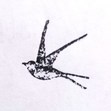Hûw Steer's Blog, page 7
November 3, 2024
6 Years of Posting Rubbish
I sat down to write something completely different this morning, but when I opened up this very website I learned this:
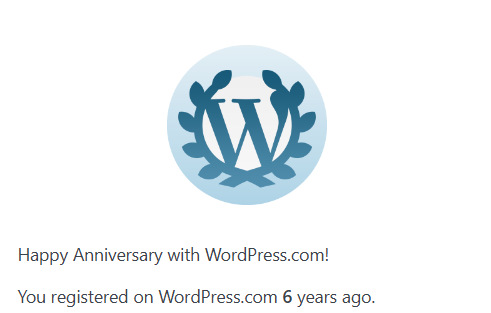
Probably should have made this post last year, given 5 is arbitrarily a more significant anniversary, but given this is the anniversary of me arbitrarily deciding to start a then-arbitrary website I feel this is appropriate.
6 years ago… I had pretty much bugger-all to talk about. In November 2018 I’d just finished my Masters, was desperately looking for actual work and had a whopping 3 short stories to my name. I essentially just wanted somewhere to put them, and somewhere to eventually put a book, if I could finish one. So I engaged the services the finest, free-est and easiest-to-figure-out-est website builder I could find after whole minutes of searching, and threw this place together.
Back then, The Blackbird and the Ghost did exist, but I wasn’t doing anything with it yet. I’d entered it optimistically into a ‘Best Unpublished Manuscript’ competition but that was it. It must have been around this time that I’d decided to actually self-publish it, because in that very first post, 6 years ago today, I boldly state that it’s going to be published before Christmas! Which was technically true, because I never said which Christmas…
I look forlornly at the still-not-finished redraft of The Owl and the Nightingale, and the post where I said it would probably be out by the end of the year, and realise that 6 years may have passed but not a lot has changed. I will continue to lean heavily on that ‘probably’.
6 years ago I had just my first three stories lying around. The Publisher’s Prize stories were a gateway for me into realising that my writing might actually be readable, but it was Making Monsters that really made me commit. To this day, 6 years later, I’ve never had another launch party for an anthology or one of my books. Maybe I should change that myself. But it’s hard to describe how special that felt, all those years ago.
So what have I done in all that time? Well, published 5 books and a bunch of shorts, which is great, but for the sake of not just blowing my own trumpet this is about the website. In 312 weeks I have made 329 posts, which is decent going. Most of them have been rambles about nothing in particular, a few have been actually informative, many have been announcements of things and a lot have been self-indulgent bollocks, for which I apologise but will not repent. Or promise to stop.
My favourites? I think the choose-your-own adventure stories I wrote a few years ago were a great experiment. Even though only a few people cast votes it was still really fun to let you lot decide where the story was going, to a degree. I’ll go back to that one of these days and do a part three, I promise.
I think the posts I’ve had the most fun writing are probably the Comics Are Stupid series, because the opportunity to just enthuse about weird stuff I’ve read is impossible to pass up. It also spares me talking my friends into a corner at parties with the same information.
And, often, this website is a place where I write about myself. If you’ve been reading this site for any length of time you’ve learned a lot about me. You know about the old crap I like, the games I play, the things I do. You know about music that makes me cry. I have, perhaps unwisely, given you opportunity to look more directly into my soul than is already possible by reading my fiction.
So thank you, to those of you who are still here, reading the rubbish I put out. If you’ve been here since the beginning, 6 years ago, or are literally stumbling on this now and wondering what the hell I’m on about, thank you. With 6 years down and many more to go I promise to change absolutely nothing and continue rambling weekly about whatever comes to mind, regardless of whether you’ll find it interesting or not.
Thanks. I hope you enjoy the next stuff, whatever it is.
Though I might give the old place a new lick of paint, if I can figure out how the more complicated design options work…
October 27, 2024
Artefacts – Being Analogue
As I have explored many times before on this blog, I am, in my soul, an analogue man. This is despite all the bits of tech I surround myself with and my de facto status as workplace ‘tech guy’ (all down to extensive Google-fu and a willingness to clumsily attack software until it submits). I’m not a Luddite, but I do still rip CDs and manually upload music to my phone because Spotify confuses me, and I only do that because all my cassette tapes are of the Goon Show and my record player weighs a ton and has no headphone jack. I know how to be modern, I just can’t be bothered.
And as I have likewise explained before, this trait is very much inherited, from my father and very much from his late father before him; Men With Many Sheds and the accompanying contents. I haven’t quite gotten all the practical aspects of this tendency yet: the pots of paint in the corner are tiny and intended for little plastic soldiers instead of walls, and the only spanner I own is in fact a novelty Hot Wheels car. In my defence, a) the car also has an Allen socket and b) I do now also own screwdrivers, so I’m getting there.
 (This is in much better condition than mine, but look at the practicality!)
(This is in much better condition than mine, but look at the practicality!)Where am I going with this, I hear you cry (and not for the first time)? Analogue is the key word from the above. I have never had truck with the modern smartwatch, nor with telling the time on a phone, and apart from one I had briefly as a kid not even with digital watches. To paraphrase Michael J. Caboose, “time is not a line, it’s a circle – that’s why clocks are round.” And so I stick to proper watches. Most of the time I wear a hefty TW Steel piece, which is scaled to look normal on big people with big wrists. As a small man with small wrists, this just means that I could tell the time from fifty feet if only my arms were that long.
For special occasions – my own wedding, for example – my antique pocketwatch comes out. They have to be special and also non-summer occasions because a pocketwatch demands a waistcoat; the one I bought for my wedding is the most expensive pocket I’ve ever owned. It always feels very satisfying to pull out such a heavy weight of clockwork, and it always takes me half an hour to wind the thing because I can’t resist just watching all those delicate cogs work their magic. How I never went full steampunk in my youth is a mystery to me sometimes.
But for really special occasions only one timepiece will do. Something slimline enough to work with a suit but carrying a gravitas that even a pocketwatch can’t provide. Something truly unique, a real statement of style. I am of course talking about the novelty penguin watch my grandfather gave me twenty years ago.
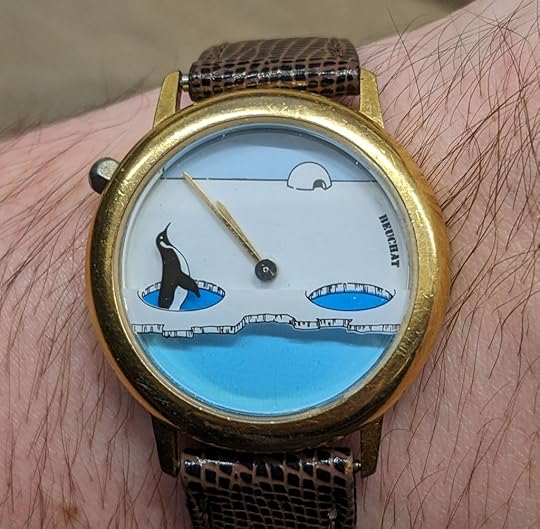
Yes, the penguin is the second hand. Yes, it dives in and out of the water every minute, a merry little soul living his best life. Yes, the strap is on the wrong way round, and I cannot for the life of me remember if I attached it wrong or if Granddad always had it that way; either is entirely possible. The penguin is a clear disc of plastic, the holes in the ice are printed on the back of the glass so it can dive ‘through’ them without breaking the illusion. I arbitrarily decided that the tip of the penguin’s beak is the ‘hand’, though this is moot as there are no numbers on the face for it to point to. It is a very stupid watch and I love it dearly.
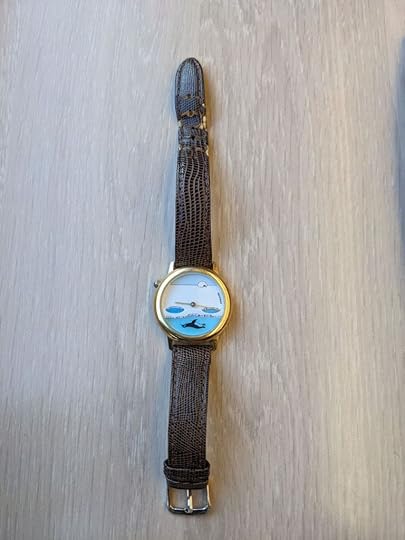
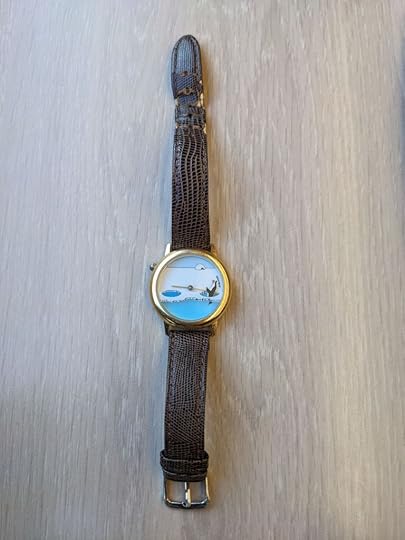
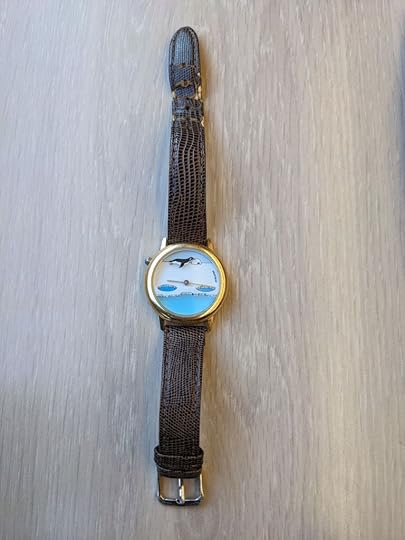
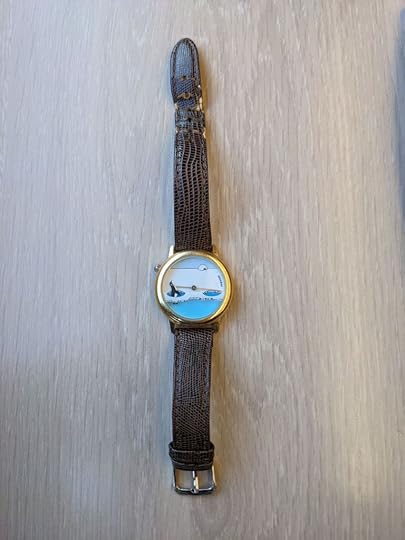
It is also, possibly, a very high-quality novelty penguin watch; while I have had no luck tracing its exact provenance, Beuchat are a long-established Swiss manufacturer of expensive diving watches. They seem to have made a similar watch with a diving dolphin (but it doesn’t have the ice overlay so it’s not as good as mine). Maybe this was some sort of novelty piece – the penguin is diving, after all. Where Granddad got it from is a complete mystery, just like half the stuff he owned. This is a man who kept a plastic bag full of Indian gemstones and Roman coins in the back of a cupboard, between the bulk box of pink water pistols and one of his dozen lawnmowers, and never told any of us. Never mind the Tower of London – stick the Crown Jewels in one of his sheds and they’d never be found.
The penguin watch is old, and silly, and impractical. It makes me smile every time I wear it. It makes me think of my mad old Granddad. He’d laugh, if I could read him this, if he could see me still wearing that watch. And then he’d go to the shed and come back with the Ark of the Covenant in a cardboard box, but only because he’d padded it out with some old instruction manuals he needed.
October 20, 2024
The Submissions Grind
The submissions grind is a relentless thing, and I haven’t been having the best time of it of late.
Or at least it feels that way. Compare, if you will, my short story submission tracker when I first built it in 2022, and said submission tracker now.
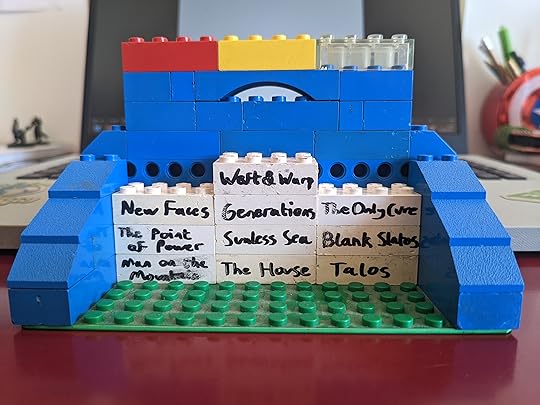
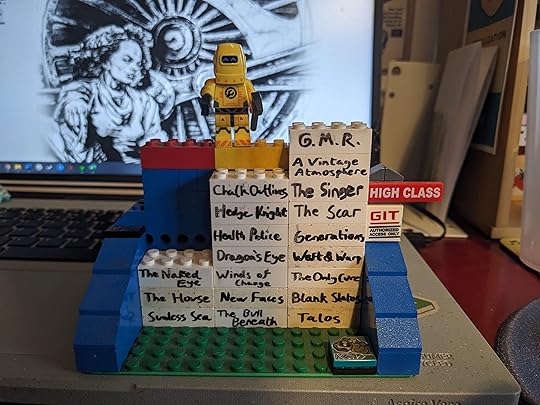
Ignore the fact that The Singer, which I was originally submitting as a novella, has now been self-published: that’s still 5 more stories accepted in the last few years, which is objectively pretty good going. You may also note that a couple of stories have been removed entirely to become published on this very website, if you want to read them.
But you can see how many new stories are on the pile, going nowhere fast. And those are the ones that are dragging me down.
(And one old one: ‘New Faces’, you will see print one day, I promise. Years after I wrote it it’s still, I think, one of my best concepts and my favourite stories.)
These are good stories, or at least I think they are. They’re better than some of the stories that I’ve already had published. But they’ve been rejected, often swiftly and brutally and almost always with form responses, the author’s bane. Some have been sitting in submission boxes for a few months now, and while on the one hand, sitting waiting for responses at least means that I haven’t had a rejection yet, on the other… it’s been bloody ages, and my hopes wane with every passing week.
Sometimes a long wait means a nice, detailed bit of feedback. Sometimes. Usually it’s a wait of months for absolutely no detail at all. In the case of my full manuscript submissions, which are also ongoing, the norm has been a wait of months – or years, in a few cases – for no response at all. With the exception of the one agent who provided a detailed chunk of feedback – and actually read the whole book – I usually get nothing, for short or long submissions.
It’s quite hard, trying to do creative work, and not getting any insight into what works and what doesn’t when you’re rejected. It’s not particularly helpful to the ol’ process of improvement.
(It’s the same story with reviews, too, though I am sympathetic to people forgetting to review books they’ve read when I, too, have to remind myself to do it as often as possible, especially for indie books which need it the most. But those reviews are mostly for other readers, not the writer. Not that that doesn’t make them important. Please review indie books. Please review my books.)
But hey: I have had acceptances, right? ‘Great Martian Railways’ came out in July this year! What am I complaining about?
Yes, ‘GMR’ was published a few months ago, and I’m extraordinarily glad it was, especially in a prestigious publication like Analog. So I have got a 2024 publication credit. But it was accepted over a year ago, and that was the last successful submission I’ve had. A year is a long time. When the lead times for publication can be this extensive, it’s a very long time. I might get an acceptance tomorrow and not have the story be released until 2026. And that is a long time to go without anything to my name.
Also, while this may be a little crass: I just had a wedding, and I am broke, and I will have to do my taxes very soon, and a short story sold is money that I could really use. I haven’t sold anything in a year. I need to pay rent and fund my crippling ‘plastic crack’ addiction.
But with the mammoth task of finishing The Owl in the Labyrinth still before me and the potential publication date getting more distant by the day I’d really hoped that a short piece or two would keep my hand in. Keep my name vaguely in the ears of a slightly wider audience. Maybe.
These are the days when writing and submitting just feels like shouting into the void. Half the time you don’t even get an echo back.
I know it’ll get better. I know I’ve been writing damn good stories and eventually they will see the light of day, one way or another. I just wish it wouldn’t take so long, and I wish I could know more about why they keep coming back to me unliked, if they come back at all.
October 13, 2024
Artefacts – The First Drafts
I dragged the heavy boxes from their resting-place, caked in the undisturbed dust of many years. I blew it away, the motes tumbling off to become a problem for future archaeologists and/or cleaners. With trembling hands, I unsealed the lids…
And actually put some books into them, to make more space on my shelves, alongside the many, many unsold author copies I keep in the deep darkness beneath my bed. I’ve got 2 boxes, and one is almost entirely full of The Fire Withins. (If anyone would like a copy, honestly just let me know. I’d like someone to read it.)
But the other day I was making room for some serious artefacts, from the earliest days of my ‘maybe I could actually become an author’ period.
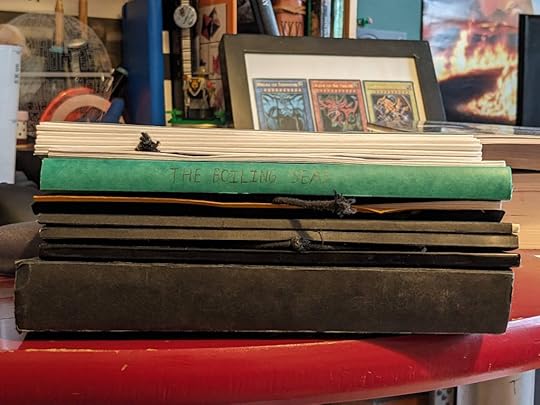
Long ago, when the pyramids were still young and I’d just started my second year of university, I finished my first book. The rewrite of my first book, at least, for the first version of it hides in an even deeper tomb, never to be seen again. I wrote it from 11 to 16. It is not good. The rewrite… is also not particularly good, but it also lacks the rest of its sequel and therefore the second half of its story. I’ll go back to it one day.
Once I was finished, I wanted to see the damn thing. It’s a brick, at almost 200,000 words, and it was the first full-length story I’d ever set down. I remember writing fight scenes on the train to my first Edinburgh Fringe, I remember sitting at my weirdly long desk in my student halls and typing away for hours. And when I was done, I went to the library, and took advantage of those delicious free print credits. You got lots of those, for essays and such, but even a humanities degree barely made a dent in my allowance (thank you, iPad, for storing so many seminar readings and sources). 200,000 words made many hundreds of pages.
And so, on premium UCL library paper, bound in premium cardboard that I got from the stationery shop underneath the entrance hall, I had myself the first and only physical copy of The Seven Shards.
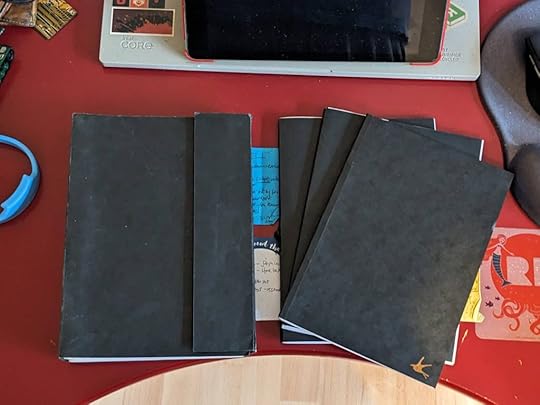 The Seven Shards (left), them novellas (right)
The Seven Shards (left), them novellas (right)It was just a nice thing to have – this was long before I’d even considered self-publishing (and this book will not be thus published for a very long time), or agents, or anything. I just wrote it because I wanted that story out of my head, and to see it physically out of my head was something special.
And I didn’t stop there. Three cyberpunk novellas, that I really need to go back to and redo because they’re not that bad, printed and bound at my little amateur press. The original version of The Blackbird and the Ghost, with all its unwieldy scenes and typos. The original print of the revised version of The Blackbird and the Ghost… with all its unwieldy scenes and typos that I still haven’t fixed to this day. Those university printers did sterling work for me, all those years ago. If I had print credits I’d still be nipping back to campus and printing off my later works; as I am now limited by paper and ink I actually have to pay for I’ve only done a hard proof of the short and sweet The Fire Within.
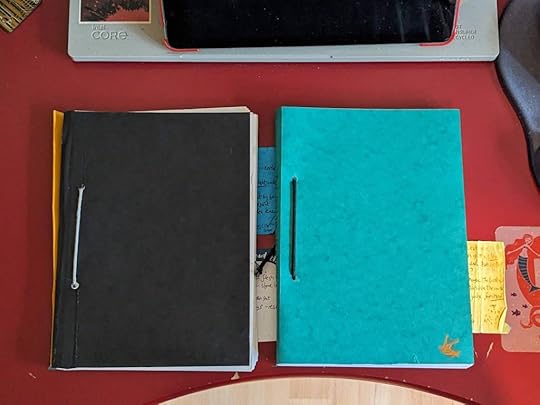 Spot the difference. (Original in black, revised in green.)
Spot the difference. (Original in black, revised in green.)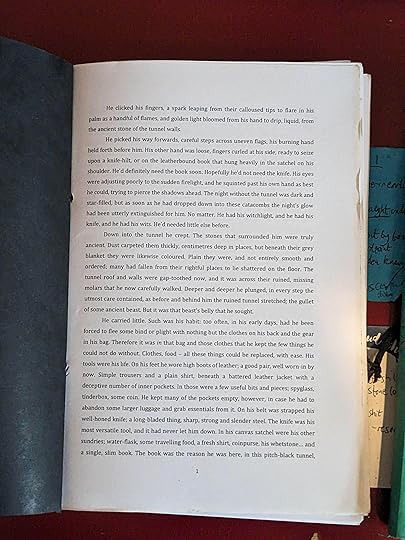
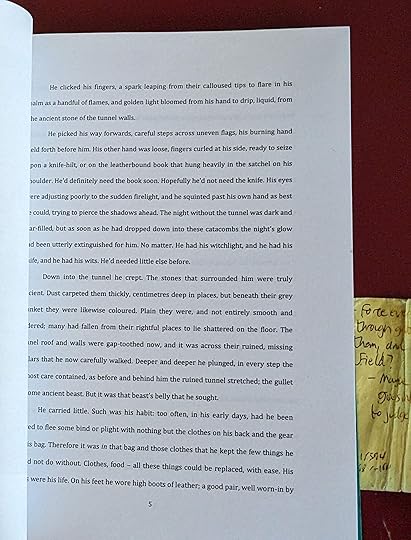
So many words that have never been printed again.
They’ve been on my shelves for many years, these completely unique books, these artefacts. They are my early days of writing in physical form. I’ve put them away now, not for any emotional reason but purely because I needed a little more shelf space and, because I wrote them, it’s not like I’m frequently rereading them. Into the box with the other author copies they have gone, tucked under my bed.
They won’t stay there forever. They will, in fact, be rather useful if and when I ever get around to revising versions of those unpublished works – it’s nice to have an actual book to read when considering how to rewrite them. They’ll need rewriting, a lot of it. I’m a very different writer now to the one I was a decade ago. But they will always be reminders of where I started.
As for the two Blackbirds, well. If I ever make the big time, maybe they’ll make nice auction items one day. Or more likely I shall hoard them, safe in the knowledge that nobody else will ever have as first an edition as me.
October 6, 2024
Fear of the Unknown – Icebreaker
I don’t normally do much horror.
As I write this post, I realise that this isn’t actually that true. I don’t set out to do horror, whether that’s writing or reading, but while I don’t usually go for pure horror I do love darker fantasy and SF that veers into the terrifying and unsettling.
I was going to say ‘I don’t write horror’, but The Only Cure, while fantasy, is definitely an unsettling piece, and Generations is again an SF-horror fusion. Another story I’m hoping might get snagged soon is definitely fantastical horror, and one of the manuscripts on the great pile of Books That Need Redrafting definitely veers into very unsettling territory. So I don’t write ‘horror’ – but I do write the odd bit of scary stuff.
And again, ‘I don’t read horror’ is also not really true. Some of my favourite indie books I’ve read in the last few years have been absolutely brilliant horror-fusion pieces: A Song For The Void was brilliant historical horror, a combination I didn’t anticipate but that worked tremendously well; In Darkness Cast is dark as hell for all that it’s a fantasy tale. Even if you’re throwing noble heroes at them, horrible monsters are still horrible monsters and the best way to make them feel horrible is to dip your quill into the dark, dark inkwell of the horror writer, and really make them nasty.
But the book that made me really think about what makes horror good – or just writing that makes you unsettled and scared, or whatever you want to call it – was Icebreaker by Steven William Hannah. Because in this frozen post-apocalyptic wasteland, where humanity survives by the skin of its teeth, the way Hannah writes the monsters in the dark absolutely fascinated me. You have to get the monsters, the threat, whatever it is, right.
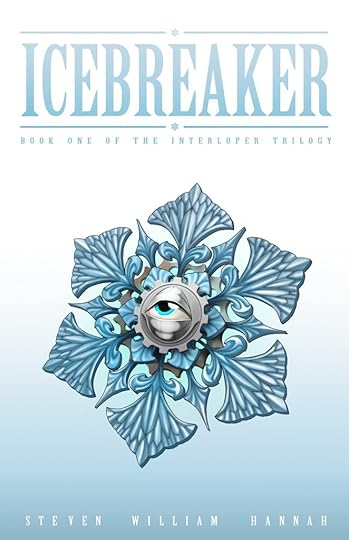
The way you write your characters being frightened has to resonate with your readers to be effective. I have written villains who I’ve tried to make unsettling. I’ve written monsters – some pretty nasty ones, I must admit – and tried to get that description just right. (The best, I think, was the alien serial killer I threw at my Kill-Team RPG players in an early session, because I got to see the looks on their faces when they realised what they were up against, and then they had to fight it.) But you can write about big pointy teeth and tentacles all you like without necessarily nailing that feeling of actual terror.
The monster – the Phenomenon – in Icebreaker is a thing that, if you look at it, or listen to it, and therefore know what it is in any way, drives you immediately insane. For the whole book, the protagonists are fighting against an evil that they cannot directly experience… and therefore an evil that Hannah cannot actually describe. The scenes where it appears are literally scenes of our protagonists donning blindfolds and earplugs, blocking out all sensation just in the hope they might survive. Even those who try to fight the Phenomenon have to do so blindly, spraying fire into the night and hoping they hit home. The entire culture of the world of Icebreaker is built around the fact that, every so often, every human being has to curl up in a ball and hope the nightmare doesn’t rip them limb from limb, and nobody has the faintest idea why.
And it works. Because Hannah writes that fear so well: he writes those claustrophobic scenes of blind, deaf characters, utterly helpless, so very realistically. You feel like you’re there with them, in the dark and silence. You, like main character Bear, desperately want to know more about the Phenomenon when he arises and see the marks it has left on the world around him. You understand those who tell Bear he’s an idiot and to leave the unknowable unknown.
It’s not like ‘horror beyond comprehension’ is new. It’s Lovecraft and all that classic eldritch stuff; ‘stare not into the abyss lest it stare into you’, etc. But the climax of the terror in those stories normally comes when the abyss is stared into, when the audience does get a glimpse of what lurks beyond the veil. To write an effective horror story without doing that is masterful. Hannah isn’t really writing about the horror itself – he’s writing fear, and doing it beautifully.
And yes, eventually we do learn a bit about the Phenomenon; yes, eventually we do see a little of what it is. But that never changes the impact of those scenes in the dark silence. It never makes them less frightening. The scraps of knowledge, the idea that you might actually know what’s out there, only makes it worse. To know nothing is scary – the possibility that you might know something, about the thing that drives you mad just by looking at it, is terrifying.
I have a new perspective on good horror writing now. It certainly makes me want to read more, which I am currently doing. It makes me want to write more, too. There are monsters lurking in the dark of my mind that I might just have to unleash.
Tis the season, after all.
September 29, 2024
The Boiling Seas – Character Dynamics
One of my favourite things about the Boiling Seas series is the character dynamic I’ve managed to stumble into. Tal, Max and Lily are a lovable bunch of misfits, and as much as I love throwing ridiculous magical set-pieces at you, my lovely audience, describing those impossible ruins and enchanted temples… there’s nothing quite like hammering out a good conversation between those three rogues.
It’s a shame, in hindsight, that it took Lily so long to show up. I think Blackbird would be a hell of a lot stronger with her around, but given the whole point of the plot is getting her well enough to be around that doesn’t really work. She wasn’t even really a character when I wrote that book – I didn’t yet know how fun she’d be to write. But looking back at Blackbird, while I still think it’s a strong book, just having Tal and Max driving the story feels a bit like Star Wars without Han Solo. That third POV and perspective on problems might be more complicated to write, but it’s worth it.
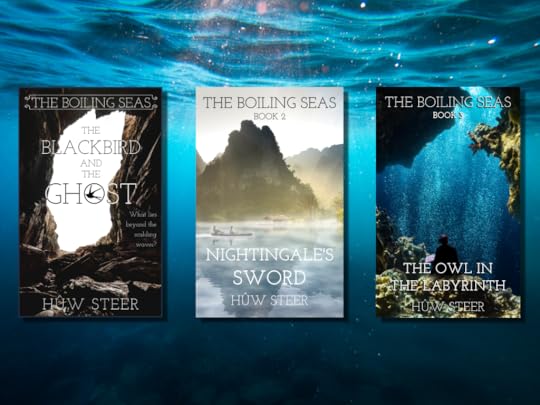
Mostly the banter, though. I love writing these three together, in all their combinations. Tal and Lily have been especially fun as The Owl in the Labyrinth progresses. I’ve mentioned before that Lily is, essentially, based on my own sister, and thus the banter between her and Tal is very natural to write, because I’ve done half of it already, just in different circumstances. Though without Max to mediate them, the insults have been getting a bit more real, the bickering more bitter. Which, again, is probably subconsciously based on real life.
And then Max is… well, I can’t spoil exactly why she’s not off on her own the whole time, but that’s another relationship that’s been fun to write for other reasons. A very different set of conversational partners in that plotline.
Soon, they’ll all be back together, though, once I do a bit more of my redraft. It shouldn’t take long. My dream team draws ever nearer to their reunion, and that’s a scene I need to give a real polish to make sure it does things justice.
Then there’s the rest of the plot to get through, of course, but that’s a near-future me problem.
I’m going to miss these three birds when I’m done. I said as much to a friend recently, to whom I related much of the above when chatting about the Boiling Seas. They wondered if I was really done with Tal, Max and Lily; I said that I probably wasn’t but I’d need to leave a good gap before thinking of any follow-up books; they asked if I’d considered doing any short stories with them.
Well I’m bloody considering it now.
I’ve done a couple of shorter Boiling Seas pieces, which are floating around this website, but apart from the not-Christmas special I haven’t done any with all three birds. Yet. Because of course that’s the perfect medium to just have fun with these characters I’ve come to love so much: little adventures, some extra crimes, some jaunts off to side locations on their quest for the Five Scrolls. There’s some built-in timeskip I can play around in at the start of Nightingale, and given I keep alluding to Tal and Lily’s teenage years on the wrong side of the law I should probably write that at some point too. I’ve built a whole world to play with… so once I’m done with the main plot, I think I’ll let myself do so.
Plus, if I write some short pieces, they’ll make great bonus features for the omnibus.
September 22, 2024
Fixing Things
I have a soft spot for broken things. I have even more of a soft spot for broken things that I can fix. I mean physical objects, by the way. I tinker with toys, not emotions.
Normally, yes, this takes the form of toys and Old Stuff; given my line of work and genetic predisposition towards having full sheds this shouldn’t be a surprise. But whenever I see something cracked or missing parts, something that most people are no longer going to want, I just have an urge to do something about it. And because I’m a big ol’ nerd with access to a wide variety of glues, paints and spare parts, I often can.
This is not to say I’m necessarily very good at fixing these things, of course. I aspire to be that guy from Toy Story 2 with all his lenses and brushes and tools, but in reality I am very much an enthusiastic amateur with little specific expertise. But hey: if it’s me doing an ok job or the bin, I think the former is preferable.
I’ve mended action figures – Transformers can be tricky, but it is possible; certain smaller ones from years ago have ball joints almost exactly the same as small LEGO ball joints, which means building whole replacement limbs can be done. And thanks to my bevy of spare Warhammer bits, I’ve occasionally gone even further with creating new parts. Something about seeing a cool robot dinosaur without its front legs tugs at the heartstrings. A bit of miniature paint will work wonders on a battered old figure, too, even if I can never get that gloss finish quite right.
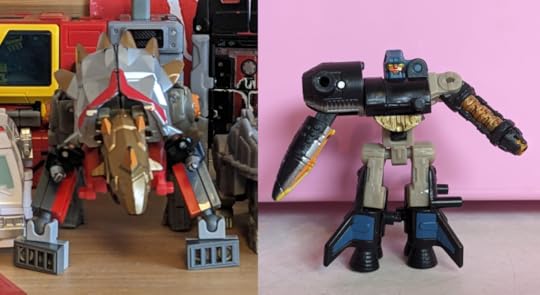 Grimstone (left) found a new home with a very excited 5-year-old; Sky Blast (right) has found new employment with my own Megatron.
Grimstone (left) found a new home with a very excited 5-year-old; Sky Blast (right) has found new employment with my own Megatron.I’ve fixed books, too. There are few things as sad as seeing a book with a ravaged cover about to be thrown away. Judicious application of tape has saved many staples of my own shelves, but sometimes one need go further… like when I measured, cut and crafted an entire replacement cover for an about-to-be-binned copy of H.I.V.E from my school library and gave it several more years of happy legible life.
The reason I’m writing this post is because of the repair job I did this week to a piece of my deepest childhood, when a Brio Percy from Thomas the Tank Engine came into work battered almost beyond recognition. Barely a scrap of green paint left on it, the bare wood scribbled on with pen… an obviously very loved toy that would not, unfortunately, be getting much more love in this state.
And, as such situations have done many times before, it touched something in me. Things like this are meant to be used: books are meant to be read, toys are meant to be played with; and seeing them reduced to a state where they can only really be thrown away just makes me sad. It’s the Toy Story talking again, all that lovely ingrained anthropomorphising of objects that humans do so well, but I just don’t want to let these things ‘die’.
So I cracked open the green paint, which, while not as bright as I’d have preferred was good enough, and did what I could for poor old Percy. It wasn’t much, but it ended up being enough. Enough for another kid to come along and give this little engine another life of love.
 Annoyingly Brio’s paint is just a bit glossy, so I need to get some varnishes for the next one. (Also I forgot to take a completely ‘before’ pic; none of that green was there before I started.)
Annoyingly Brio’s paint is just a bit glossy, so I need to get some varnishes for the next one. (Also I forgot to take a completely ‘before’ pic; none of that green was there before I started.)It’s the little things, I suppose. Every time I manage to scrape the corrosion off old battery compartments, every time I find the missing pieces of a LEGO set, every time I glue new hands onto ancient bits of Warhammer, it feels like… I don’t know. Maybe giving back a little. We all have those toys and objects that mean so much to us for all our young lives. It feels better to fix them, to pass them on, than it does to throw them away. It feels like they deserve it.
These are things that create stories, things that spark the imagination, the sort of things that give me the ideas to write what I do. What is storytelling but the same thing you used to do on the playground with your friends, just tidied up a bit?
My shed’s going to end up full of so much broken crap when I’m old, isn’t it?
September 15, 2024
Wandering Skyrim
Skyrim is a game that comes ready-packed with things to do. Hundreds of quests, hundreds of locations; dozens of wars to win and thousands of monsters to destroy. You, the player, have critical tasks from the very beginning of the game, and each one leads to more questlines and objectives. The main quest is very nicely laid out, actually, as it takes you pretty much all over the map and thus brings you into the area of most of the major side-quests. Off to Riften to find a bloke in some sewers? Oh look, I’ve got to walk past the Thieves’ Guild to do so. Need to consult some wizards about this magic scroll? I sure hope the College of Winterhold isn’t looking for help with some archaeology when I drop by.
The game does a good job of introducing you organically to all the myriad things it has to offer, and on my original playthrough of the game – which began in 2011 and has spanned many years since, including all the DLCS and leading me to get the Platinum trophy on PS3 for all the (base-game) achievements* – you’d best believe I did all of them. The game encourages you to get stuck in to all these sub-stories as you go.
Alternatively, you could just… not do any of that. You can wander the land and just do what you like, with no pressure, no obligation. You can just be, in a land that, despite being coded in 2011, is still a beautiful place.
That’s what I’m doing now, anyway. And by the Nine Divines, it’s relaxing.
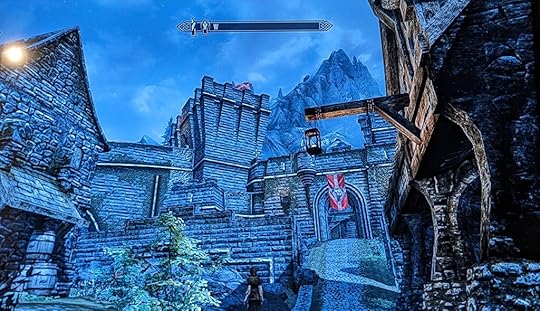 I apologise, incidentally, for the quality of these ‘screenshots’, but I play Skyrim as the Divines intended: on my original PS3 disc from 2011, on my original PS3, with its complete lack of screenshot functionality and controllers that don’t work unless you plug them in.
I apologise, incidentally, for the quality of these ‘screenshots’, but I play Skyrim as the Divines intended: on my original PS3 disc from 2011, on my original PS3, with its complete lack of screenshot functionality and controllers that don’t work unless you plug them in.It had been many years since I last picked up Skyrim when I started this playthrough a few months ago. Originally it was just a bit of fun: I vaguely recreated my DnD character, Sir Geoffrey, because several of the other players were doing the same in the far more modern Baldur’s Gate 3. For variety’s sake I decided to do less sneaking and much less magic than my original playthrough and focusing on swordplay, like Geof; I fought a few dragons, started some questlines, and then…
And then I just started vibing, for want of a better term.
As I played this character I was also watching the excellent videos of AnyAustin on YouTube, who when he’s not conducting employment censuses of the main cities of Skyrim makes videos about bits of the world that you’d never otherwise think about. About where all the rivers in Skyrim flow from; about the poor-quality woodworking; about the strange little places in-between all those huge set-piece cities and ruins with a strange little beauty all of their own.
And as I watched these videos and then played the game myself, I found myself slowing down. I started ignoring the big plot hooks, the major questlines. I started walking more, instead of fast-travelling absolutely everywhere. I thought about what Geof might actually want out of his life in Skyrim. I stopped playing the game so much and started living in the world.
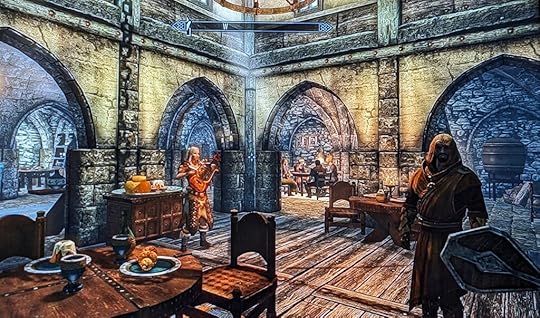 Yes, Erandur, you are in the photo.
Yes, Erandur, you are in the photo.Instead of only following quest markers I look around, see cool stuff and just head on over there. That ruin looks interesting – never mind my actual objective, let’s go explore that! I bought a house in Solitude, the capital of Skyrim, because I’d never really lived there before in any of my playthroughs and there were so many new people to get to know. (And also because the fantasy of home-ownership is far more achievable when I can magically transmute iron into gold.) Because I’m off in a different part of the map I’m running into quests I’d almost forgotten about and really appreciating the effort put into them. Never mind the Dark Brotherhood: the Bard’s College is where it’s at! Why would I want to run around fighting dragons when I can hang out at a little festival, drinking spiced wine and listening to poetry?
(And, of course, listening to the beautiful soundtrack. The main theme is obviously incredible; one does not simply hit ‘Load Game’ before sitting on the main menu for 5 minutes and listening to it in full; but the incidental tracks provide wonderful ambience. Visit a tavern and you can ask the bards to play for you, diegetically!)
Obviously I am still running around fighting dragons, because that’s what the game is for, but not because of questlines that make me do so. I’m just wandering around and exploring for the joy of it, and in doing so I’m finding the places and little stories that often go forgotten in the shadow of the big ‘main’ quests into which much more development time was poured. Like Frostflow Lighthouse, a self-contained quest that you can only start by happening to stumble across the lighthouse itself and with a story told entirely through a few written notes and by the environment itself – a story that is genuinely tragic and superbly constructed.
But more than that, I’m finding those little moments that AnyAustin has been showcasing so well. I’m appreciating the small elements of design that make games like Skyrim feel so rich and vibrant even if you don’t consciously notice them. Like the fact that every house in Solitude has a different fireplace design to the rest of the cities; being made of stone they can have proper ovens in their kitchens. (It’s also really annoying because the devs forgot to put actual game-usable cooking pots in any of them, but that’s by the by.) Like the amount of detail put into the many hundreds of books in the game – some of which are actually quite good reads. The satisfaction of filling a bookcase in Proudspire Manor is just as nice as filling one in my actual house. Better, even; virtual books don’t take up any physical space.
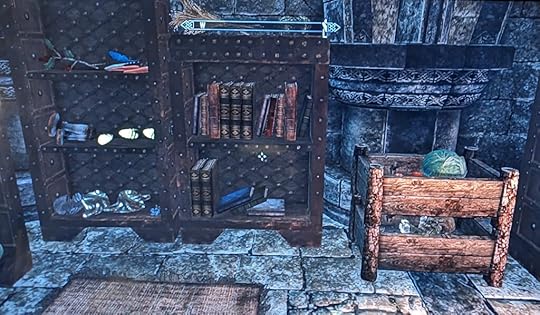 Every time I play this game, I end up having to buy multiple houses just so I can have more bookshelves to store all the books I pick up.
Every time I play this game, I end up having to buy multiple houses just so I can have more bookshelves to store all the books I pick up.The way that more hawks spawn in the sky around Solitude because you’re up in the mountains and that’s where they live. The way that different areas of the game have different flowers growing because of the climates. The way that taking a stock interior and just hanging some moss off the beams and knocking over a table can make the atmosphere feel so very different. Meeting wandering traders on the road. A broken sword at the foot of an abandoned shrine.
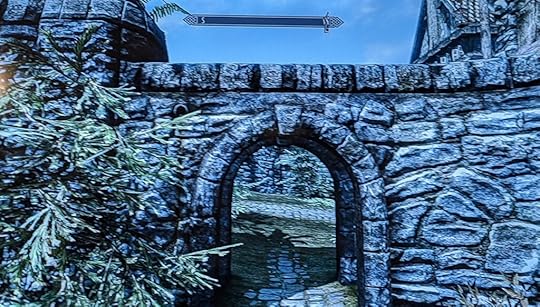 This little archway in Solitude. I just like it.
This little archway in Solitude. I just like it.Games like Skyrim give the player agency. Not by making the story and the world bend because of your choices – there’s a little of that but not much – but by simply opening up the world before you and saying, ‘do anything you want’. And while it might imply that ‘anything’ is one of the myriad fully-written plots and subplots that the game is stuffed with, it doesn’t have to be. You don’t have to fight dragons. You can just pick flowers and watch the sunset. And that’s nice.
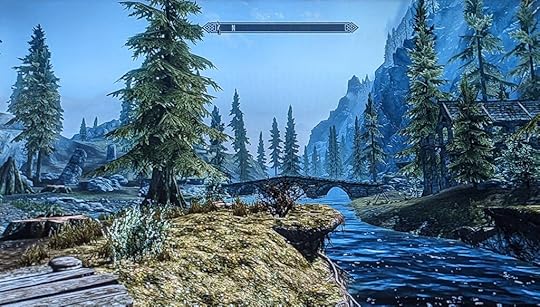
*I need to max out the Vampire Lord and Werewolf perk trees and build 2 more houses, and that’s it for the DLCs, too.
September 8, 2024
What Have I Been Doing: August 2024 Edition
Hello again. Got married, had a lovely time, now I’m back.
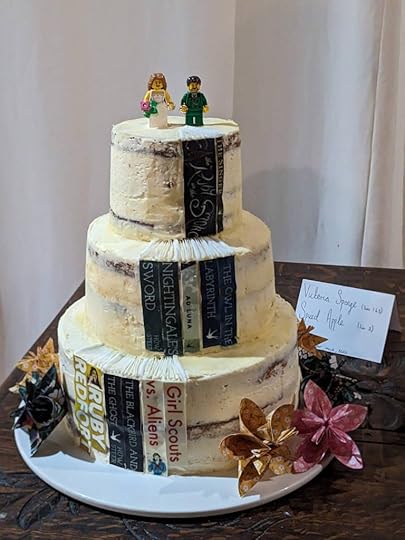
Yes, it was a fantastic wedding; we are now extremely broke and extremely happy, and our house is full of decorations, cards and lawn games that we haven’t figured out what to do with yet. An extraordinarily nerdy affair all round. I’ve been wearing my ring on a cord around my neck while at work so I don’t scratch it to death on LEGO, and every time I do so the Black Riders’ theme begins to play in my head.
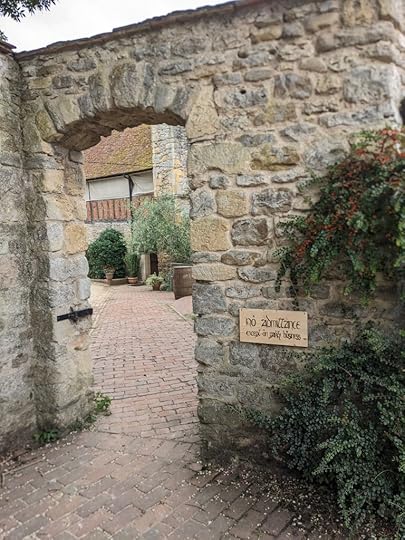
So now that’s all finished, what have I missed – and what’s next? Creatively, I mean. You don’t need to hear about all the admin we’ve still got to polish off.
In the middle of what were, until the excellent wedding bit, some of the most stressful few weeks of my life, a few things happened, and I shall go through them now.
Ad Luna did very well indeed in the latest Narratess sale – more than 300 copies, which is mad and fantastic. If you were one of those 300 people, hello! Hope you enjoy the book. Sales like these are incredibly important for indie authors everywhere just for getting more books in more people’s hands and more reviews on people’s back covers. (So please drop a review or a rating if you have the time!)
Nextly, a competition occurred. The second SFINCS – the Speculative Fiction Indie Novella Contest – has begun, and I’ve thrown my hat into the ring with The Singer. I’m up against some stiff competition… by which I mean my reading list has grown dramatically with a bunch of my rival entrants, and I’m looking forward to seeing what happens. If nothing else I’m in very good company.
I have also been sending a manuscript or two around various agents, and for the first time ever I actually had a response that wasn’t a form rejection. It was, in fact, a request to read the whole book! Before you get too excited the agent then rejected the book, but having actually read it they were able to give me some comprehensive feedback and suggestions for improvement, and an open invitation to resubmit an updated version of the manuscript. So overall, almost as good as I could have hoped for.
I’m going to do that rewrite, I think. I’ve got a lot more material for an unfinished part 2 that could be worked in and ideas on how to address some of the other problems. But I’m not going to do that just yet, because I’ve got something else that demands my attention.
WHAT ABOUT THE OWL IN THE BLOODY LABYRINTH?I haven’t done much on the second draft/edit/rewrite/wrangling of Boiling Seas 3 in recent weeks, because I have, in fairness, been quite busy. But now I am in fact married, it’s back to the grindstone. I have a lighter workload for the next few weeks so I’m going to use that time to knuckle down and make some proper progress if I can. There’s still a lot to do to get this book in fully readable shape. Am I certain it’ll be done by the end of the year? No. Am I confident that it’ll at least be nearly done? Sure! I intend to take a week off work completely at some point in the next couple of months and do nothing but write, if needs be.
So it’s back to work on that edit this week, and we’ll see where we go from there.
WHAT ABOUT EVERYTHING ELSE?Short stories are also on my mind, as I’m coming to the end of one which I’ve quite enjoyed. It’s sort of a sequel to another one that’s going round magazine submissions at the moment, and if and when one of them ever comes out I’ll do a post here explaining where what is actually a very old idea of mine came from. But I’m trying in general to keep an eye on submission windows and get things rolling on the short front. As I mentioned earlier, I’m broke, and both my creative heart and empty wallet would be delighted to see some more of my shorter works in print.
And speaking of that, to round things off, you can read one of my previously published stories for free, right now! Because I got distracted by wedding stuff I completely missed that this had actually come out a month or two ago, but: Grimdark Magazine have created a sampler issue, packed with stories they think they best represent their delightfully gritty publication. To my surprise, they thought my The Only Cure was one of those stories – and so it’s in there. If you didn’t catch it the first time around in Grimdark Magazine #25, you can sign up to their mailing list (free) and you’ll be sent the (also free) sampler magazine!
So there we are. Lots to do and increasingly little time to do it in; isn’t that always the way? Let’s see how I go, shall we?
August 25, 2024
On Speeches
Firstly: if you’re reading this and it’s still the 26th or 27th of August, Ad Luna is free right now in the Narratess Indie Sale. Get it. Get it now. And get a bunch of other SF&F books too.
I am currently faced with the biggest writing challenge of my life. I’ve been doing this a long time. I’ve written a dozen books or more, countless stories, millions of words. I’ve described alien worlds beyond imagining and tried to delve into the heart of human emotion. I’ve written for children, I’ve written for adults. I’ve done some poetry, which you will probably never see, and I’ve even written comedy, which if you have seen, I implore you to forget.
All of that – all those stories, all those characters, all that effort – pales in comparison to the fact that, this week, I have to write my own wedding speech.
After over a year of it being ‘months away’, suddenly I’m getting married this week. In a week from the time of writing we’ll be clearing up the venue after the wedding. My front room is full of boxes of stuff, a not-insignificant portion of which is silly hats; I have a lovely new suit whose shirt I really need to iron and whose shoes I will let my father polish because he’s much better at it than me. I have a fiancée sitting in the next room right now! I’ve had a fiancée for some time, in fairness; that part I’ve had a while to get used to. She’s very nice. We have a venue, we have food, we have Legal Stuff, we have music.
And at some point in the day I have to talk.
I thank the gods that we decided not to write our own vows, because I’m fairly sure I’m going to forget my own name when we’re up in front of the registrars, let alone be able to deliver something so personal under that much pressure. The speeches, at least, will all be delivered when our audience is replete with excellent food and wine and thus generally inclined to cheer at pretty much anything, which takes the pressure off a bit. A bit.
There’s something of a formula to follow, of course. Between me and my at-that-point-wife we have to thank everyone, and we’ve divided the list already between ourselves. One of the most useful things I learned from comedy was to keep it short, so I’ve only got to fill about 5-8 minutes, and thanks should fill up a chunk of that. But then… I have to talk about some other stuff. Mostly my wife, I imagine, which shouldn’t be hard. We’ve been together for coming up on a decade and we do quite like each other, so I’ve both got a lot of material to draw on and it’s all reasonably positive.
But can I think of what to write? Can I hell.
I’ve done this sort of thing before… just not for me. I’ve done emotional speeches of all kinds for all sorts of characters in all sorts of stories. I’ve even dipped a toe into romance from time to time! (In fact I’ve nicked dialogue for some upcoming stuff from what I said when I proposed. Not because it was a smooth line. Definitely not that.) But when it comes to writing it for myself? To expressing my feelings about my fiancée to anyone other than my fiancée herself?
I am not very often lost for words. I’ve written a lot of them. But these feel like fairly important ones to get right.
No pressure, eh?
Also, this time next week I will genuinely be clearing up after the wedding, so no blog: I’m going to be busy enough that day. Normal service will resume on the 8th of September.

